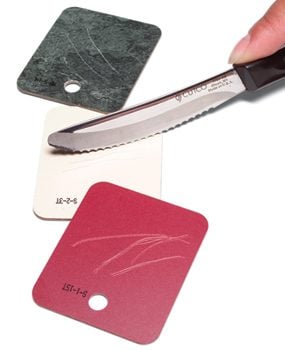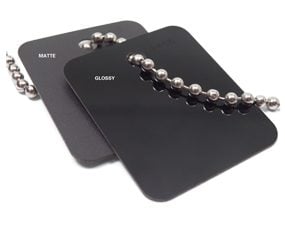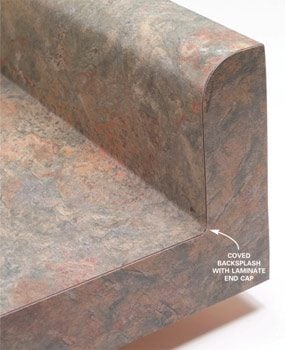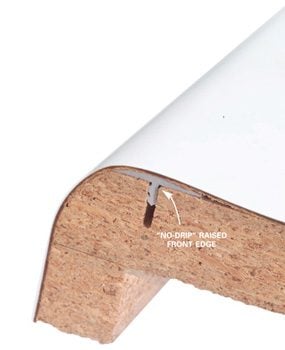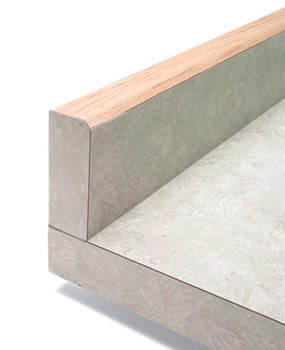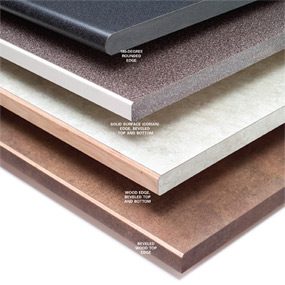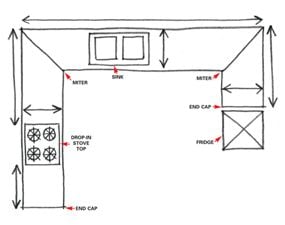How to Select Laminate Countertops
Updated: Sep. 06, 2019Expert advice for getting a high-style, easy-care countertop at an affordable price.
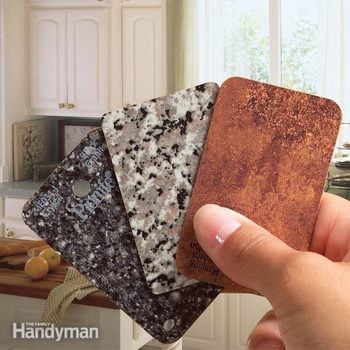
- Time
- Complexity
- Cost
- An hour or less
- Beginner
- Varies
Laminate Countertop Colors: Beware of dark colors—they show scratches!
Although laminate is durable, scratches are inevitable because countertops typically get heavy wear. Scratches tend to be light colored, which makes them highly visible against deep colors and virtually impossible to hide.
If you love a deep color, find a pattern in that color that’ll help disguise scratches. Test this yourself by taking a color chip and dragging the coarse bottom of a coffee cup across it, and then a steak knife and a pizza cutter. Check the visibility of the scratches.
Another option is to choose a “color core” laminate, which has a much thicker color layer than regular laminate. Test this laminate as well. Unfortunately, this type is three to four times more expensive and not as durable.
Check out the ultimate guide for how to clean laminate countertops.
Test laminate countertop colors first in your kitchen
Laminate is available in a huge array of colors and patterns, which can make decision-making tough. So don’t make your decision at the home center. Select three or four chips you like, plus one or two “wild card” choices, and take them home. Put them on the counter for a week or more—live with them—and judge them against the cabinet and wall colors in your kitchen. Observe them both in daylight and under the room lights in the evening. The type of light often has a significant impact on the color. You can also request samples directly from laminate countertop manufacturers. One common brand is Formica countertops; click here to see a wide selection of Formica countertops.
If the small chips available at every kitchen showroom aren’t adequate, ask if larger pieces are available. Or have paint mixed to match the chip and paint a larger board to set in your kitchen.
If you want to venture beyond one color or pattern, say for a fancier counter edge or different-colored backsplash, take samples of those home as well.
To make sure you get a good selection, visit a kitchen specialty retailer as well as a home center. You may find a somewhat different color selection and wider range of edge options. To preview the colors and patterns available, visit the laminate manufacturers’ web sites.
Select a matte finish to help hide wear
You’ll basically have two choices of surface finish: matte and glossy. Any type of glossy finish will accentuate scratches, and wear will dull it in heavily used areas. So stick with the matte finish. Some matte finishes tend toward the glossy side, so run your scratch test on these chips too. Also, some types of matte finishes have a coarser surface, which can be quite attractive but may require more careful cleaning, especially if they’re light colored.
For economy and convenience, choose a post-formed top with a non-drip edge
Laminate countertops are available in a number of shapes and edge treatments. The most common is called “post-formed,” which means that the top is formed from a single piece of laminate that’s shaped into a backsplash at the rear and a rounded edge in front. Since it’s a single piece, it has no seams to separate and no corners to catch dirt. It’s a snap to keep clean. And some have a slightly raised front edge to keep spills from running over. It’s also usually the least expensive choice.
Normally you have to order laminate countertops, but if you’re not picky about color, you can sometimes buy post-formed countertops off-the-shelf in home centers. You’ll find limited colors, sizes and shapes, and it’ll take a bit more work to install them because you’ll have to cut them to length and install laminate end caps. You can buy 45-degree angled sections for corners and join them. And you can’t beat the price.
Alternatives to the conventional post-formed backsplash
The conventional post-formed, coved backsplash has it hands down when it comes to cleaning and convenience. But consider other options if you want to add that decorator touch to your kitchen. A butt backsplash, which sits on top of the countertop, allows you to choose different colors, patterns and materials to accent an otherwise plain top. Or combine the backsplash with the wall covering.
You can run tile, stone, sheet metal or laminate itself on the wall down to the countertop and run a smooth bead of caulk along the countertop/wall joint. This method gives you a bit more countertop depth, but make sure you think through all the wall details before you choose it.
Custom edge options
Laminate has a lot of style, especially when it comes to countertop edges. Dealers can show you a wide range of them, from simple bullnoses to beveled laminate, to wood, to various inlays—at a wide range of prices! It doesn’t take much to make the countertop look elegant. You can even get pre-manufactured edges with greater design detail. Here are several buying tips:
- Avoid edges with sharp corners and sharp lower edges if you have toddlers. They’ll no doubt bump their head at some point.
- Wood edges are handsome, but they’re more vulnerable to moisture and wear. You have to touch up the finish periodically to keep them looking sharp.
- If you opt for a natural stone–style laminate, choose a beveled edge to mimic a stone edge.
- Make sure any edging you choose won’t interfere with drawers or the dishwasher door.
Measure carefully before ordering
All you need for your initial visit to a kitchen dealer is a rough sketch of your kitchen and rough measurements. A designer will be able to take that information and work up a rough estimate of costs for the various options. If you order your countertops and have the dealer install them, the dealer will probably send out someone to take exact measurements. It’s their responsibility to get it right.
But if you plan to install the countertops yourself, you’ll probably have to take your own measurements for the order. Any wrong measurement is an expensive mistake! Make sure the dealer walks you through all the details to include on the final countertop plan, including the locations and sizes of appliances, cabinet sizes, sink positions, islands, walls, etc. Then triple-check your measurements to ensure accuracy. And make sure the longest countertop piece will fit through the door and around obstructions to get to your kitchen!
What is Laminate?
Laminate is made from layers of resin-coated brown paper that are sandwiched together under high heat and pressure. The top layer is a decorative (colored) paper that’s covered with a hard plastic overlay. The result is a hard, durable material that’s water resistant, easy to clean and relatively inexpensive. What’s more, under heat and pressure it can be easily shaped, making it ideal for the rounded edges of countertops.
Since square corners usually show the brown edge, some manufacturers make a laminate with color throughout by using colored paper for all layers. However, these types are less durable, more brittle and more expensive.
Required Tools for this Project
Have the necessary tools for this DIY project lined up before you start—you’ll save time and frustration.
- Tape measure
Required Materials for this Project
Avoid last-minute shopping trips by having all your materials ready ahead of time. Here’s a list.
- Laminate samples
